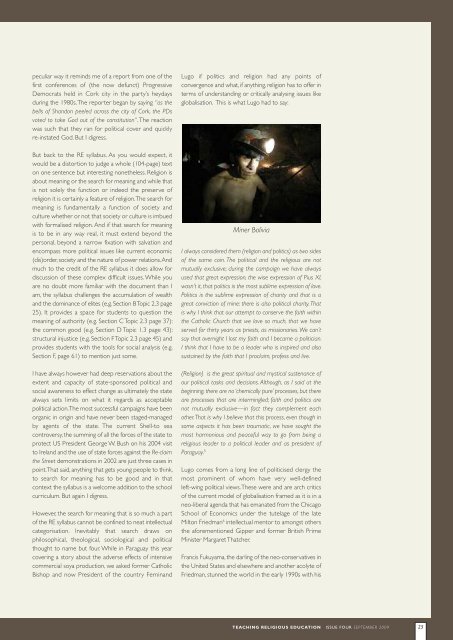TeachingRE Issue 4.pdf - the Second Level Support Service
TeachingRE Issue 4.pdf - the Second Level Support Service
TeachingRE Issue 4.pdf - the Second Level Support Service
Create successful ePaper yourself
Turn your PDF publications into a flip-book with our unique Google optimized e-Paper software.
peculiar way it reminds me of a report from one of <strong>the</strong>first conferences of (<strong>the</strong> now defunct) ProgressiveDemocrats held in Cork city in <strong>the</strong> party’s heydaysduring <strong>the</strong> 1980s.The reporter began by saying “as <strong>the</strong>bells of Shandon peeled across <strong>the</strong> city of Cork, <strong>the</strong> PDsvoted to take God out of <strong>the</strong> constitution”. The reactionwas such that <strong>the</strong>y ran for political cover and quicklyre-instated God. But I digress.But back to <strong>the</strong> RE syllabus. As you would expect, itwould be a distortion to judge a whole (104-page) texton one sentence but interesting none<strong>the</strong>less. Religion isabout meaning or <strong>the</strong> search for meaning and while thatis not solely <strong>the</strong> function or indeed <strong>the</strong> preserve ofreligion it is certainly a feature of religion.The search formeaning is fundamentally a function of society andculture whe<strong>the</strong>r or not that society or culture is imbuedwith formalised religion. And if that search for meaningis to be in any way real, it must extend beyond <strong>the</strong>personal, beyond a narrow fixation with salvation andencompass more political issues like current economic(dis)order, society and <strong>the</strong> nature of power relations.Andmuch to <strong>the</strong> credit of <strong>the</strong> RE syllabus it does allow fordiscussion of <strong>the</strong>se complex difficult issues. While youare no doubt more familiar with <strong>the</strong> document than Iam, <strong>the</strong> syllabus challenges <strong>the</strong> accumulation of wealthand <strong>the</strong> dominance of elites (e.g. Section BTopic 2.3 page25). It provides a space for students to question <strong>the</strong>meaning of authority (e.g. Section C Topic 2.3 page 37):<strong>the</strong> common good (e.g. Section D Topic 1.3 page 43):structural injustice (e.g. Section FTopic 2.3 page 45) andprovides students with <strong>the</strong> tools for social analysis (e.g.Section F, page 61) to mention just some.I have always however had deep reservations about <strong>the</strong>extent and capacity of state-sponsored political andsocial awareness to effect change as ultimately <strong>the</strong> statealways sets limits on what it regards as acceptablepolitical action.The most successful campaigns have beenorganic in origin and have never been staged-managedby agents of <strong>the</strong> state. The current Shell-to seacontroversy, <strong>the</strong> summing of all <strong>the</strong> forces of <strong>the</strong> state toprotect US President George W. Bush on his 2004 visitto Ireland and <strong>the</strong> use of state forces against <strong>the</strong> Re-claim<strong>the</strong> Street demonstrations in 2002 are just three cases inpoint.That said, anything that gets young people to think,to search for meaning has to be good and in thatcontext <strong>the</strong> syllabus is a welcome addition to <strong>the</strong> schoolcurriculum. But again I digress.However, <strong>the</strong> search for meaning that is so much a partof <strong>the</strong> RE syllabus cannot be confined to neat intellectualcategorisation. Inevitably that search draws onphilosophical, <strong>the</strong>ological, sociological and politicalthought to name but four. While in Paraguay this yearcovering a story about <strong>the</strong> adverse effects of intensivecommercial soya production, we asked former CatholicBishop and now President of <strong>the</strong> country FerninandLugo if politics and religion had any points ofconvergence and what, if anything, religion has to offer interms of understanding or critically analysing issues likeglobalisation. This is what Lugo had to say:Miner BoliviaI always considered <strong>the</strong>m (religion and politics) as two sidesof <strong>the</strong> same coin. The political and <strong>the</strong> religious are notmutually exclusive; during <strong>the</strong> campaign we have alwaysused that great expression, <strong>the</strong> wise expression of Pius XI,wasn’t it, that politics is <strong>the</strong> most sublime expression of love.Politics is <strong>the</strong> sublime expression of charity and that is agreat conviction of mine: <strong>the</strong>re is also political charity.Thatis why I think that our attempt to conserve <strong>the</strong> faith within<strong>the</strong> Catholic Church that we love so much, that we haveserved for thirty years as priests, as missionaries.We can’tsay that overnight I lost my faith and I became a politician.I think that I have to be a leader who is inspired and alsosustained by <strong>the</strong> faith that I proclaim, profess and live.(Religion) is <strong>the</strong> great spiritual and mystical sustenance ofour political tasks and decisions. Although, as I said at <strong>the</strong>beginning, <strong>the</strong>re are no ‘chemically pure’ processes, but <strong>the</strong>reare processes that are intermingled; faith and politics arenot mutually exclusive—in fact <strong>the</strong>y complement eacho<strong>the</strong>r.That is why I believe that this process, even though insome aspects it has been traumatic, we have sought <strong>the</strong>most harmonious and peaceful way to go from being areligious leader to a political leader and as president ofParaguay. 5Lugo comes from a long line of politicised clergy <strong>the</strong>most prominent of whom have very well-definedleft-wing political views.These were and are arch criticsof <strong>the</strong> current model of globalisation framed as it is in aneo-liberal agenda that has emanated from <strong>the</strong> ChicagoSchool of Economics under <strong>the</strong> tutelage of <strong>the</strong> lateMilton Friedman 6 intellectual mentor to amongst o<strong>the</strong>rs<strong>the</strong> aforementioned Gipper and former British PrimeMinister Margaret Thatcher.Francis Fukuyama, <strong>the</strong> darling of <strong>the</strong> neo-conservatives in<strong>the</strong> United States and elsewhere and ano<strong>the</strong>r acolyte ofFriedman, stunned <strong>the</strong> world in <strong>the</strong> early 1990s with hisTEACHING RELIGIOUS EDUCATION ISSUE FOUR SEPTEMBER 200925


